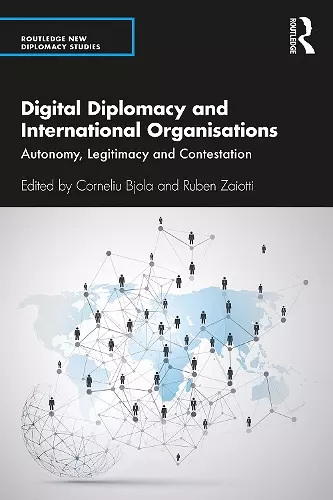Digital Diplomacy and International Organisations
Autonomy, Legitimacy and Contestation
Corneliu Bjola editor Ruben Zaiotti editor
Format:Paperback
Publisher:Taylor & Francis Ltd
Published:30th Oct '20
Currently unavailable, and unfortunately no date known when it will be back
This paperback is available in another edition too:
- Hardback£145.00(9780367470012)

This book examines how international organisations (IOs) have struggled to adapt to the digital age, and with social media in particular.
The global spread of new digital communication technologies has profoundly transformed the way organisations operate and interact with the outside world. This edited volume explores the impact of digital technologies, with a focus on social media, for one of the major actors in international affairs, namely IOs. To examine the peculiar dynamics characterising the IO–digital nexus, the volume relies on theoretical insights drawn from the disciplines of International Relations, Diplomatic Studies, Media, and Communication Studies, as well as from Organisation Studies. The volume maps the evolution of IOs’ "digital universe" and examines the impact of digital technologies on issues of organisational autonomy, legitimacy, and contestation. The volume’s contributions combine engaging theoretical insights with newly compiled empirical material and an eclectic set of methodological approaches (multivariate regression, network analysis, content analysis, sentiment analysis), offering a highly nuanced and textured understanding of the multifaceted, complex, and ever-evolving nature of the use of digital technologies by international organisations in their multilateral engagements.
This book will be of much interest to students of diplomacy, media, and communication studies, and international organisations.
‘This carefully crafted, theoretically and empirically rich interdisciplinary book lays the foundation of a new sub-field of inquiry: the impact of digital technology on international organizations. A must read for everyone interested in the present and future of digital multilateral diplomacy.’--Emanuel Adler, Professor Emeritus, University of Toronto
‘In a digital, networked world facing problems that are bigger than single country can address, there can be fewer more significant subjects for scholars of communication and international relations than the methods by which international organizations are working in digital space. Bjola and Zaiotti have created a unique and timely anthology which adds much to our collective knowledge of contemporary public diplomacy. Original and eclectic, this collection deserves a wide readership.’--Nicholas J. Cull, Professor of Communication, University of Southern California
‘This carefully crafted, theoretically and empirically rich interdisciplinary book lays the foundation of a new sub-field of inquiry: the impact of digital technology on international organizations. A must read for everyone interested in the present and future of digital multilateral diplomacy.’--Emanuel Adler, Professor Emeritus, University of Toronto, Canada
‘In a digital, networked world facing problems that are bigger than single country can address, there can be fewer more significant subjects for scholars of communication and international relations than the methods by which international organizations are working in digital space. Bjola and Zaiotti have created a unique and timely anthology which adds much to our collective knowledge of contemporary public diplomacy. Original and eclectic, this collection deserves a wide readership.’--Nicholas J. Cull, Professor of Communication, University of Southern California, USA
'The digitalisation of the United Nations may be its greatest transformation yet, and its most crucial test. Will the digitalisation of the world enhance or undermine equality and inclusion? Will it further respect for human rights or undermine it? Will it leave us more or less secure? As the UN turns 75, the Secretary-General’s Roadmap for Digital Cooperation charts a course for a future in which all stakeholders play a role in addressing these issues. Our approach to policy setting in the digital era has to be as innovative as digital technologies are. We need decentralised, nimble and multi-stakeholder approaches. This book asks and answers the right questions at the right time. It provides a comprehensive overview of where we are behind, the pitfalls we face through digitalisation, and how we safely transform the structures that have shepherded us thus far, to meet the extraordinary demands of the digital era. It is a must-read for all those looking to transform our world for the better.'--Fabrizio Hochschild, United Nations Under Secretary-General and Special Adviser
ISBN: 9780367469993
Dimensions: unknown
Weight: 453g
304 pages